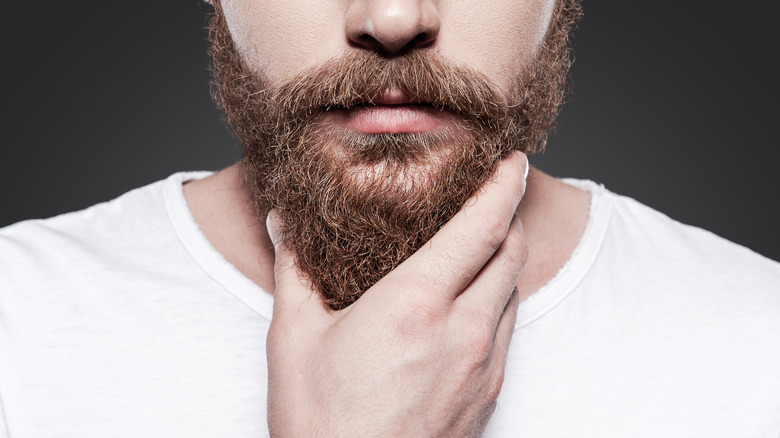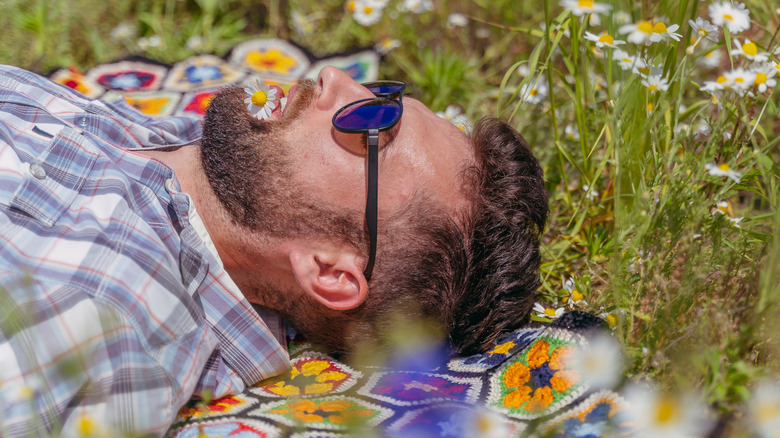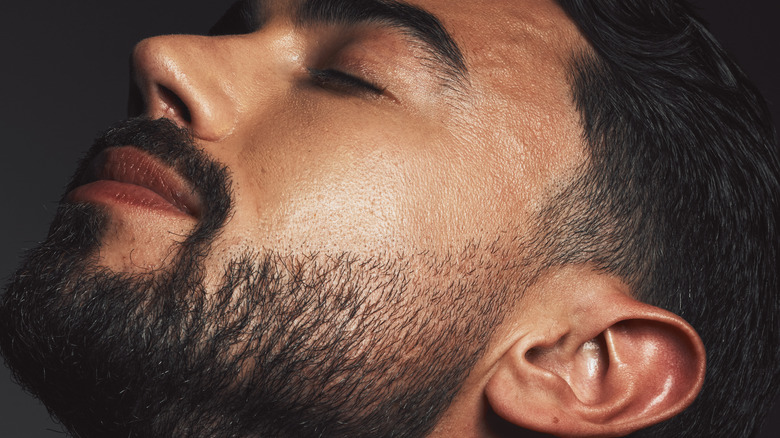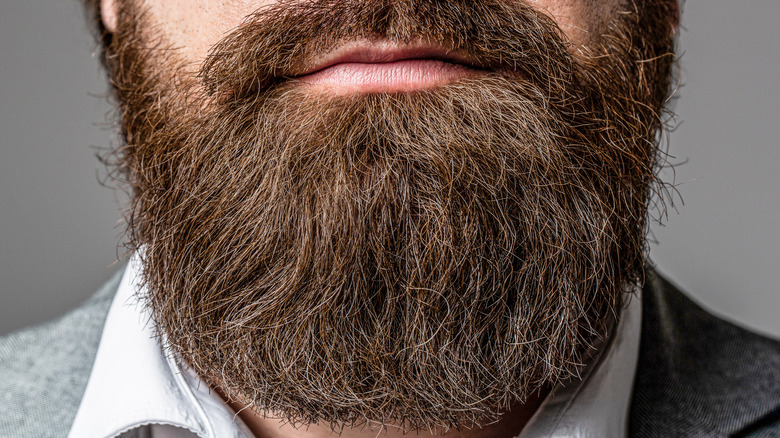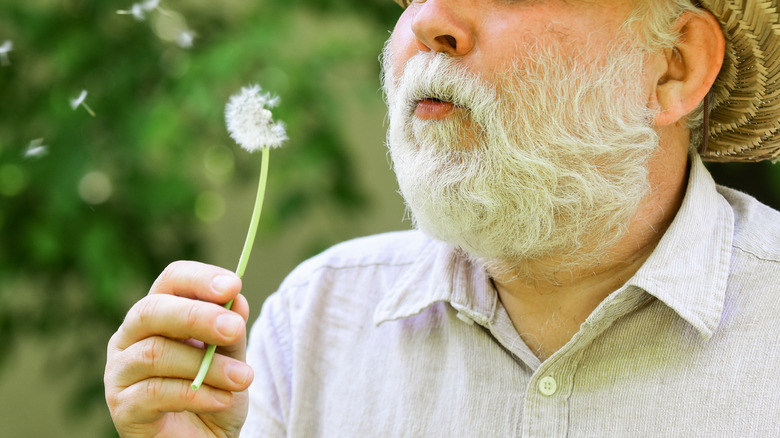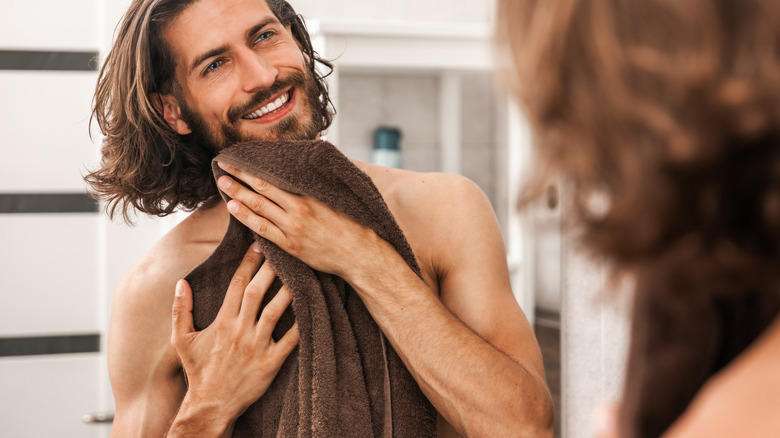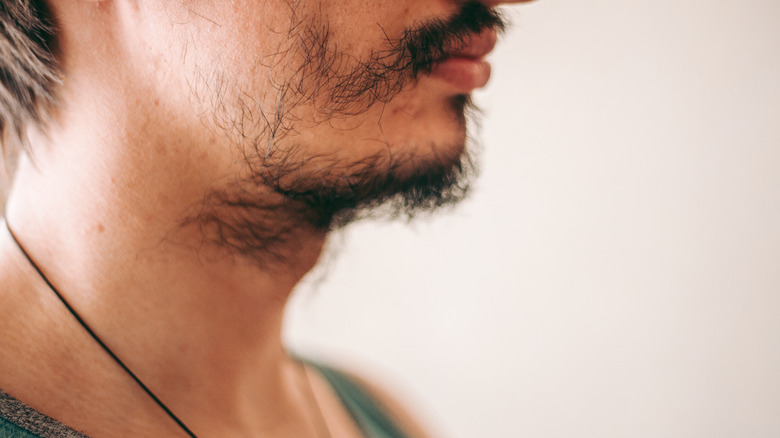Surprising Health Benefits Of Having A Beard
Beards come in all shapes and sizes. You may find ZZ Top's outrageously long beard attractive, or perhaps you prefer the short, tame Ryan Reynolds style. Without a doubt, beards surely run the gamut when it comes to preference. They can also vary in texture: beards can be thick and woolly, smooth and lustrous, or even somewhere in between.
As such, some men take pride in their beard-grooming. What's more, having a beard has typically been associated with qualities of strength, purpose, and masculinity. But a well-groomed beard may actuallly have benefits beyond any proposed stature or defining appearance. From being an unexpected ally during unfavorable temperatures to providing protection from the harshest elements of Mother Nature, maintaining a beard just might be the key to you feeling better about yourself, in more ways than one.
Keep reading to discover some of the many surprising health benefits of having a beard.
A beard acts as a natural sunscreen
Just like slathering sunscreen on your skin, having a beard can prevent sun damage to a certain extent. According to researchers at the University of Queensland, tests using model heads revealed that facial areas covered with hair reduced their sun exposure by one-third compared to spots not covered by a beard. Moreover, the ultraviolet (UV) protection was as much as 21 SPF, which is comparable to a sunscreen with medium protection.
For areas with larger, thicker beards, the protection was on the higher end, although it tapered significantly for all bearded men as the sun angle became more severe. Of course, the beard will only protect the part it covers. One way of interpreting this is if one is merely sporting a goatee, sun protection will be limited to a very small area; conversely, when one's beard starts to look like a woolly mammoth, the radius of coverage naturally increases.
And because the beard is a natural sunscreen, skin cancer protection is an added plus. According to a 2020 review in the Canadian Medical Association Journal, 90% of skin cancers result from exposure to damaging UV rays, which beards help protect against.
It can function like a built-in wind shield
When the wind chill factor increases, many of us reach for our scarves or ski masks. Thing is, we only really get to prepare for this if we're expecting cold, windy weather. But for those caught in an unexpected windstorm, it's not always an option to take cover or stay indoors. And even when we're able to anticipate these seasonal changes, we don't always have practical clothing on hand.
But if you're someone who sports a beard, congratulations: You have a built-in wind screen that will help protect your face from the chilly wind. It may also keep the skin underneath it more youthful, while protecting it from irritation or wind burn. That's because when skin is exposed, the wind can weaken its outer layer, which can lead to chaffing and expose the more sensitive skin layers to the sun.
Hence, your beard's wind-shielding benefits may be twofold. Not only can it keep your skin layers supple and intact, but it can also reduce potential UV damage.
It acts as insulation
Having a beard offers certain benefits when it comes to insulation, depending on the weather. It can keep you warmer in the winter — and, interestingly enough, cooler in the summer.
According to a 2012 study published in the British Journal of Dermatology, men sporting a beard increased their facial warmth by up to three degrees compared to the exposed faces of clean-shaven men. One reason is because a beard can prevent the natural warmth of one's face from escaping.
But the beauty of having a beard is that its insulation goes both ways — it doesn't just work like a blanket. Hence, in warmer weather, a bearded gent may have an easier time staying cool, despite his woolly exterior. Consider the science: As air circulates through water, it reduces the elevated temperature, like in the case of a swamp cooler. Since a beard holds sweat and moisture closer to one's face, it can produce a similar cooling effect whenever a sudden breeze kicks in.
A beard may reduce allergic reactions
In addition to providing facial coverage, a beard also acts as a helpful filter. It can keep allergens like pollen and dust from entering your nose, throat, and lungs. By protecting your body from such agents, it can help keep throat and lung disease at bay. According to the American Lung Association, a bushier beard may also offer some protection against asthma triggers such as smoke, dust, or pet dander.
Though the filtration aspect of a beard is beneficial, proper grooming is a necessity. When left mangled and dirty, a beard can collect allergens, which can eventually make their way into one's respiratory system. And besides, an untidy beard is neither pleasant nor attractive. As far as bacteria goes: Sure, even a well-groomed beard can harbor some, but not likely enough to get you sick. In fact, it poses no more threat than the natural strains of bacteria that live on your skin. A major challenge, however, is covering it completely when necessary to shield from airborne illnesses, as many types of masks can't fully cover a bushy beard.
A beard can be a natural moisturizer
Outdoor exposure can dehydrate the skin. Luckily, beard-bearing gents have a built-in moisture seal.
By shielding the face against the sun and wind, a beard can act as a natural moisturizer. Furthermore, shaving often reduces the skin's natural oils. As such, maintaining a beard means those natural oils stay on the skin, keeping it soft, supple, and healthy.
But that does not mean all bearded men are exempt from having dull, dry, or flaky skin. In fact, dry skin can build up underneath bushy layers of facial hair. And according to Curology, even beards can bear dandruff.
To get the best out of a beard's moisture-sealing potential, it is important to exercise good beard-grooming habits. These include washing one's beard regularly, avoiding harsh soaps and long, hot showers, applying a quality beard oil, and using a stiff brush to help exfoliate the skin it covers.
Sporting a beard may reduce your chances of bacterial infection
Some people avoid growing beards due to the possibility that they may harbor and spread bacteria. But interestingly, a 2022 paper in the journal Medicine (Baltimore) suggests otherwise.
In the study, the non-bearded participants were revealed to have more bacteria than their beard-bearing counterparts. Even more interesting, the bacterial load was significantly higher in the bald-faced participants. But does an abundance of bacteria translate to higher infection rates? Not necessarily. According to Merck Manual, plenty of bacteria reside on the skin in a harmless way. It's only when the bacteria enters through abrasions such as scrapes, nicks, punctures, or burns that infections may develop.
So, how might a beard reduce bacterial infection? One possibility is that bearded men don't have repeated exposure to razors, which can cut the skin and potentially lead to an infection. Additionally, a beard can serve as a fluffy line of protection, prevent any nicks or scratches on the skin underneath it.
Having a beard may boost your immunity
A beard can filter out pollen, dust, or other potential allergens. But it can also collect some within its furry threshold — and cause an unexpected benefit in the process (via LifeHack).
The way a beard holds onto small quantities of these particles may actually help strengthen a person's immune system. Daily exposure to these allergens can actually build up one's immunity, which can help prevent allergic reactions. With that said, it's certainly not prudent to neglect keeping your beard clean just to achieve this. Instead, washing your beard twice a day can help keep these allergens to a beneficial minimum.
And while a beard doesn't prevent a common cold, it may help the body to heal and recover. The insulating effect of having a beard may actually aid the body's immune response, since one's body temperature rises in response to a cold in order to eliminate it from the body.
Sporting a beard may prevent acne
Acne may result from bacteria entering a cut on the skin, which can happen if you frequently shave your beard. Frequent razor use may cause irritation, which can increase your chances of developing those unsightly bumps on your face. But for those who opt not to shave often, having wayward hair follicles isn't a very likely occurrence. In addition, if you already have acne, having a beard can be beneficial in covering it up on your face.
Regardless, one can still have acne-prone skin, despite having a protective beard (via AcneStar). Thus, beard hygiene is essential, especially for those with sensitive skin. The accumulation of dust, oil, dirt on a beard can exacerbate breakouts. To counter this, a good comb-through several times daily may help. Washing your beard twice a day is also recommended. Be sure to scrub it gently, though. Lastly, changing your pillow cases every three days (and washing face towels in between) may also be helpful.
A beard can boost your appearance for a healthy outlook
Historically, beards have been associated with masculinity, strength, and resilience. A study published in Evolution and Human Behavior reported that based on the researchers' findings, both men and women tend to perceive fully bearded men as healthier, stronger caretakers (as opposed to beardless men or men with minimal facial coverage via a beard).
Having a beard doesn't always evoke an image of increased strength or better performance, though (per a review in Royal Society Open Science). With that said, the mere aspect of self-affirmation may result in more confidence and a better self-image, which can positively impact both your mental and physical health (via Kentucky Counseling Center).
And of course, this can help you adopt a more positive mindset when it comes to everyday life. Having a healthy outlook can be defined as having a sense of coherence, which can help you overcome stress and adverse situations (per a study in Health Reports).
It may reveal your nutritional status and possible health conditions
Just like the hair on your head, a thinning or patchy beard can indicate a condition known as alopecia. While not harmful in and of itself, extreme hair loss, accompanied by weight fluctuation, changes in energy levels, and digestive issues may indicate a thyroid disorder.
Thinning hair may also reflect your nutritional status — it can indicate chronic malnutrition, inadequate protein consumption, or even anemia (for which a common symptom is hair loss), according to registered dietitian Paul Salter (via The Healthy). Meanwhile, if your beard is dry and brittle, it may hint at more than just lack of grooming. Like thinning hair, dry and brittle hair may result from insufficient protein, as well as a lack of essential vitamins (such as vitamins A, D, E, and C).
That said, not all men can grow full and voluminous beards. The texture and growth of a beard may depend on a person's genetic factors or ethnicity (via Cleveland Clinic).

